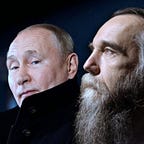Alexander Dugin is the man they call Putin’s brain. While some quibble over how influential he is in the Kremlin, according to my information he is highly regarded by Vladimir Putin. This does not mean that Putin calls him daily for advice but his ideas have helped shape how the Russian regime sees global politics.
This two-part podcast and article will be very useful for understanding the mentality behinds Putin’s actions in Ukraine and beyond.
There is a huge amount to cover so we’re going to do things a bit differently: we are going to break every rule of storytelling by giving you the punchline first. This means you can listen to the first few minutes of the podcast or read the summary paragraphs to get the critical points. But, what you’ll likely find is that the main points are so shocking you’ll want to subscribe to hear the full story.
There are many angles from which we could talk about Alexander Dugin. For example, Professor Stephen Hicks, a regular on my show, TRIGGERnometry, has spoken extensively on the subject of whether Dugin is a fascist and as you’ll see Dugin has absolutely no problem in relying on the works of people who inspired the Nazis.
However, I want to avoid the tempting but low resolution take here which would be to make ourselves feel morally superior by associating him with something we find repugnant. Instead, I want to focus on the cold, hard geopolitical ideology he advocates. Many of you will find repugnant enough on its own.
In 1997, Dugin wrote a book called the Foundations of Geopolitics: The Geopolitical Future of Russia. We’re going to break down the key sections shortly but first, to illustrate why this matters it is a book in three parts. The third is largely irrelevant for our purposes but the first two are really interesting.
Part 1 is a historical overview of what geopolitics is about according to Dugin. In it he explains why there will always be a stand-off between what we call the West and Russia. This is really important because it sets up Part 2 which uses the conclusions of the first part to explain why Russia is the centrepiece of Eurasia which is destined to control the entirety of the Eurasian continent from the English Channel to the Sea of Japan through both military and diplomatic means. He says explicitly that Russia and Russians can only survive by expansion and empire-building. This doesn’t always mean war but if war is a continuation of politics by other means and your political vision is to control the entire continent… war is an inevitability.
One final point before we get into it: the second part of the book reminds me most of Nicolo Machiavelli’s The Prince, not so much because of the contents but more because it is clearly aimed at winning over the ruler to whom it is addressed.
Part one is scholarly. Part two is an instruction manual for ruling Russia. This is important given the book was published shortly before Boris Yeltsin’s drink problem ended Russia’s brief flirtation with democracy. It is at this point, in 1999, that Vladimir Putin was anointed by Yeltsin as his successor. He rules Russia to this day.
The opening section of the book is an extensive look at men Dugin calls the founding fathers of geopolitics. If this sounds academic, it’s because it is. However, as promised, we’ll get straight to the punchline and make it simple too:
According to the geopolitical theories Dugin has hand-picked, there is an eternal conflict between two types of civilisations: trading nations and land-based nations. In the modern world, we see this with the stand-off between sea powers like the US and Britain and land powers like Russia and China.
Rather than being something random or unique to our time, this is a geopolitical constant that has been true since antiquity. The Punic Wars between Carthage, a trading, sea-faring people, and Rome, a land-based civilisation, were one of the first examples. There are countless others.
Trading nations are necessarily individualistic like Britain and the US while land-based nations are necessarily collectivist and militaristic like China and Russia. The ideologies they subscribe to are not accidents but are a feature of their geography and other natural features.
Sea powers will always try to constrain the expansion of land powers by surrounding them and/or ensuring that land powers don’t join forces.
The reason Russia matters is that it controls the Heartland, the central part of Eurasia which gives it the potential to control the entire continent and more than half of the world’s resources with it. America wants to prevent this from happening by constraining and defeating Russia as it did in the Cold War.
The creation of a single empire that controls the entire Eurasian continent from the English Channel to the Sea of Japan is a natural antidote and the only sustainable answer to America’s attempts to meddle in European affairs. Russia is no regional power, it is a special, independent civilisation which sits at the very heart of the continent and is best-placed to control all of Eurasia. And, as we’ll see in part 2, according to Dugin, controlling the entire continent is not only Russia’s destiny – it’s the only way Russia and its people can survive.
That’s the punchline. Now let’s get into the detail:













